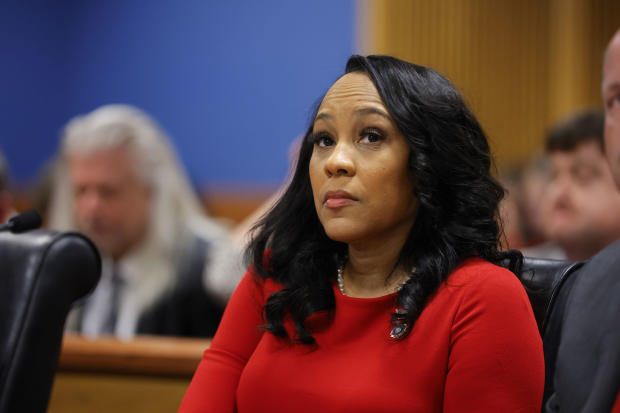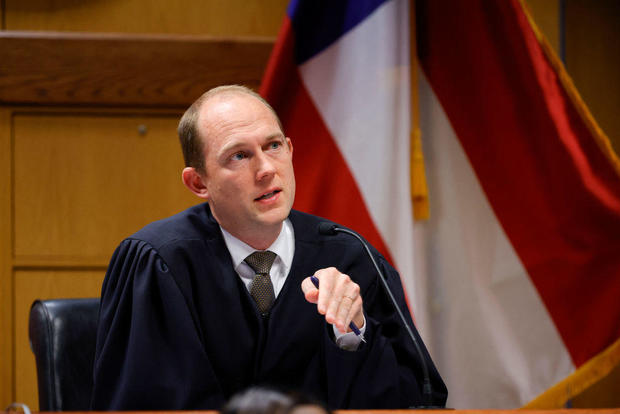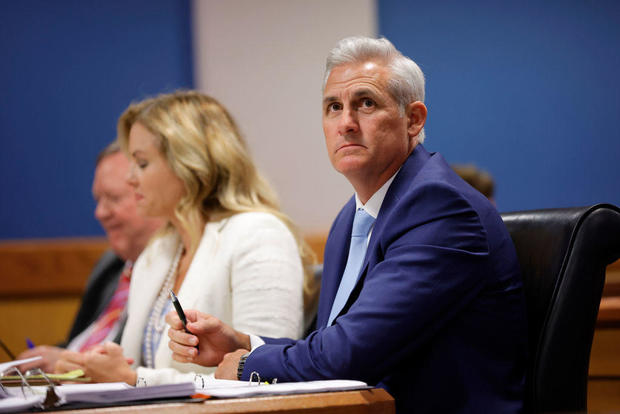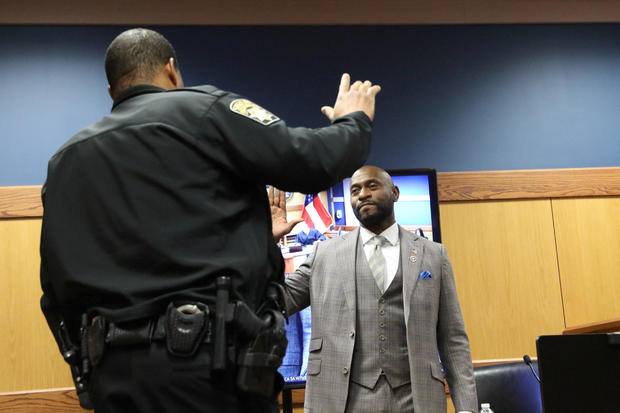Attorneys for Trump, Fani Willis spar at final hearing over removing district attorney from Trump Georgia case
Atlanta — Whether Fulton County District of Attorney Fani Willis should be removed from the Georgia election interference case against former President Donald Trump and his co-defendants is now up to the Fulton County judge overseeing the matter, who said he would make a decision within the next two weeks.
At the three-hour proceeding before Superior Court Judge Scott McAfee, attorneys for each side presented legal arguments for and against disqualifying Willis from the case over her romantic relationship with special prosecutor Nathan Wade.
It capped a series of extraordinary hearings following allegations from Michael Roman, a GOP operative charged along with Trump, that Willis and Wade had an "improper" romantic relationship, and that the district attorney financially benefited from it. Trump and seven others joined Roman's effort to disqualify Willis, Wade and her office from prosecuting the racketeering case against them, and are seeking to have the charges against them dismissed.
Prosecutors and defense attorneys gathered in the Atlanta courtroom to present their closing arguments to McAfee. Wade was attendance for the entirety of the hearing, while Willis sat at the prosecution's table to watch Adam Abbate, who works in her office, give his presentation.
The judge did not issue a decision from the bench, saying he has several legal issues to sort through and factual determinations to make before issuing a ruling.

"If this court allows this kind of behavior to go on and allows DAs across the state by its order to engage in these kinds of activities, the entire public confidence in the system will be shot and the integrity of the system will be undermined," said John Merchant, a defense attorney representing Roman who opened the arguments for the defendants.
Abbate said there has been "absolutely no evidence that the district attorney has benefited at all," or would benefit in the future, from the prosecution of the case.
Roman claimed that the relationship between Wade and Willis began before she hired him as special prosecutor in the case against Trump in early November 2021. The two admitted in a court filing that they did have a personal relationship, but said it started in 2022.
Both Willis and Wade testified during evidentiary hearings last month and divulged personal details about their relationship, financial affairs and travels to places like Napa Valley, Belize and Aruba. During several hours on the witness stand, Willis forcefully defended herself from accusations she acted improperly and financially benefited from Wade's hiring.
Defense attorneys claimed that Wade paid for hotel rooms, cruises and getaways, though both prosecutors said they split the costs associated with their travels and that Willis often reimbursed Wade in cash. To demonstrate that Willis typically used cash to cover expenses, on Tuesday prosecutors filed an affidavit from Stan Brody, who worked at a winery in Napa that she and Wade visited last year. Brody asserted that Willis paid $400 in cash for two bottles of wine and a tasting.
The district attorney had accused Ashleigh Merchant, Roman's attorney, of spreading lies and "salacious" rumors.
"You've been intrusive into people's personal lives," Willis said during her testimony Feb. 16. "You're confused. You think I'm on trial. These people are on trial for trying to steal an election in 2020. I'm not on trial, no matter how hard you try to put me on trial."
Friday's hearing

Defense attorneys representing Trump and his co-defendants were given 90 minutes to make their arguments for why Willis and Wade should be disqualified. Abbate, the prosecutor, had the same amount of time to present the district attorney's case.
During his presentation, John Merchant accused Willis of developing a financial interest in the case in violation of the rules of professional conduct, which "created the appearance of unfairness by setting a prosecutorial relationship with her boyfriend that she had been dating for two years, according to the testimony."
Though Wade and Willis testified that they split expenses related to their trips, John Merchant said Willis received a benefit of roughly $9,200 that cannot be accounted for. He accused the district attorney of "intentionally" crafting a scheme to benefit Wade.
"She put her boyfriend in the spot, paid him and them reaped the benefits from it," John Merchant said. "She created the system and then didn't tell anyone about it."
He said that if McAfee finds that Wade and Willis' relationship began in 2019 — roughly two years before his appointment as special prosecutor — and Wade's hiring was improper, it undermines the indictment charging Trump and his co-defendants.

Both Steve Sadow, who is representing Trump, and Craig Gillen, another defense lawyer, accused Willis of engaging in misconduct when she delivered a speech at a church in January, shortly after the allegations about her relationship with Wade were made public. Though Willis did not mention Wade by name, she defended his qualifications and suggested that racism was behind the claims.
Gillen and Sadow said the speech was designed to prejudice potential jurors against the defendants.
"She chose to inject race into the minds of the listeners, and virtually everybody in this community and literally everyone in this country has reviewed and analyzed that speech that she made in a premeditated way," Gillen said.
Sadow argued that Willis and Wade have the strongest motive to lie about the start of their relationship.
"Who has the best motive of anyone to lie? They do. Who has the most at stake to lie? They do. Who wants to stay on this case, for whatever the financial reason may be? They do," he said.
Citing records from Wade's cellphone that were obtained by the defense, defense attorney Richard Rice suggested they communicated extensively throughout 2021.
"I don't even think lovestruck teenagers communicate that much," he said.
Rice also told McAfee that the two "have some difficulty expressing the truth when it comes to their relationship and these cases." Wade, he claimed, lied in filings submitted in his divorce proceedings. He accused Willis of falsely certifying on ethics forms that she had not received gifts worth more than $100.
"It defies imagination that she could somehow forget about all these trips, all these dinners, all these day trips," Rice said.
Harry MacDougald, who is representing former Justice Department official Jeffrey Clark, claimed that Willis and Wade have made the Fulton County District Attorney's Office "a global laughing stock because of their conduct."
Abbate argued that the defense fell short of meeting the standard required to disqualify Willis and accused the opposing side of making "material misrepresentations." He called testimony from Robin Yeartie, a former longtime friend of Willis, "at best inconsistent," and said the defendants misstated the law about what is required for the district attorney and her office to be removed from the case.
No evidence was produced during the earlier evidentiary hearings that showed the defendants' constitutional rights were affected by Wade and Willis' relationship, Abbate said. He reiterated that their romantic relationship began in March 2022,
and said Willis repaid Wade for her share of their travel and trips.
McAfee, though, said it is no longer "speculation and conjecture" that there was a personal relationship between the prosecutors, and that money changed hands. "Where the ledger stands" may still be an open question, the judge said.
But Abbate said it is still unproven that Willis benefited financially from the relationship, and he accused defense attorneys of attempting to "harass and embarrass" her by invoking a tax lien unrelated to the proceedings.
The relationship timeline
The timeline surrounding Willis and Wade's relationship has emerged as a crucial issue in the effort to kick the district attorney and her office off the case. Yeartie claimed the relationship with Wade pre-dated his appointment on Nov. 1, 2021. Yeartie testified that she witnessed the couple being affectionate with one another.

Defense attorneys also questioned Terrence Bradley, Wade's former law partner and divorce attorney, about his communications with Wade and text messages he exchanged with Ashleigh Merchant about the relationship between the two prosecutors before she filed a motion exposing their private dealings.
After asserting attorney-client privilege while testifying twice last month, Bradley was called back to the stand at a hearing Wednesday. He said he had been "speculating" when he told Ashleigh Merchant in a message that the relationship between Wade and Willis started before Wade's hiring. Bradley repeatedly said he had no direct knowledge of when it began.
Prosecutors sought to discredit both Bradley and Yeartie. They revealed during the evidentiary hearing last month that Bradley left the firm he shared with Wade following an accusation of sexual assault. Bradley forcefully denied the allegation, and said earlier this week that he has not spoken to Wade in more than a year.
Lawyers with the district attorney's office also said Yeartie left her job there on poor terms after she was told she could either resign or be terminated. Willis testified last month that she has not spoken with Yeartie for more than a year, and said she "betrayed" their friendship.
Abbate continued working to undermine Bradley and Yeartie's credibility during his closing arguments, calling them both "disgruntled."
Bradley in particular, he said, was "vengeful" and a "speculator" who had reason to lie about Willis and Wade's relationship because he has "disdain" toward his former law partner after he was expelled from their law firm following the sexual assault allegation.
The controversy over Willis' romantic relationship with Wade has cast a shadow over the prosecution involving Trump and derailed the case for several weeks. Trump and his allies face charges over alleged efforts to overturn the results of the 2020 presidential election in Georgia. Several original co-defendants have taken plea deals, while the remaining defendants have all pleaded not guilty.
Heading into Friday's hearing, there were lingering disputes over evidence that both sides have sought to admit. Defense attorneys want McAfee to admit Wade's cellphone data as evidence, claiming it shows he was in the vicinity of a condo Willis rented from Yeartie in Hapeville, south of Atlanta, at least three dozen times in 2021. They said testimony about location data from Wade's phone show that he was near Willis' condo late at night and into the early morning hours in the months before he was tapped as special prosecutor.
Prosecutors have also said Brody, who worked at the Napa winery that Wade and Willis visited, is available to testify Friday if the court declines to accept his affidavit.
McAfee said at the start of the hearing that he was ready to hear the legal argument regarding what prosecutors and defense attorneys have already presented and said he may be able to make a decision without the cellphone records and testimony from Brody. The judge did not rule out further proceedings for admitting the additional information.
Melissa QuinnMelissa Quinn is a politics reporter for CBSNews.com. She has written for outlets including the Washington Examiner, Daily Signal and Alexandria Times. Melissa covers U.S. politics, with a focus on the Supreme Court and federal courts.
TwitterDisclaimer: The copyright of this article belongs to the original author. Reposting this article is solely for the purpose of information dissemination and does not constitute any investment advice. If there is any infringement, please contact us immediately. We will make corrections or deletions as necessary. Thank you.





